Pittsburgh Chess League Round 3: back to chess after a month off
Nov 11, 2012 · 7 minute read · CommentschessPittsburghPittsburgh Chess LeaguePittsburgh Chess Club
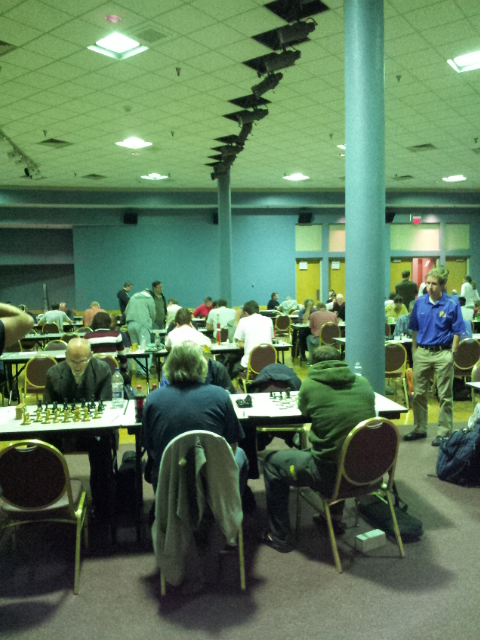
Round 3 in progress
I had a break from chess
I took a whole month off from playing chess, after completing both a six-round Pittsburgh Chess Club Tuesday night tournament and a round of the Pittsburgh Chess League.
I welcomed the break because there were many projects I had temporarily put on hold during my comeback to chess. But after about three weeks, I mysteriously began to have chess dreams arrive in my sleep, and I felt the craving for battle. So I looked forward not only to round 3 of the Pittsburgh Chess League, but also signed up for the next Pittsburgh Chess Club Tuesday night tournament, which starts this week!
Today’s lesson
In this round of the Pittsburgh Chess League, round 3, our team, the CMU Tartans, was paired against the Phalanx Lords. We ended up winning another match (we won our match in round 2, and had a byte in round 1). My game was the next-to-last to finish, taking almost four and a half hours to complete. I was so exhausted afterwards!
Today’s lesson: passive moves are not only bad, but often clump together psychologically, magnifying their badness!
The complete annotated game
At your convenience, you can enjoy playing over the game with my annotations, including diagrams.
Preparation
Since I took a month off from chess, and had no time to engage in any chess study whatsoever, I went into my game without any preparation. I didn’t even know exactly whom I was going to face, or what color I would play. In fact, I had originally guessed that I was going to play Black on third board against someone, but I ended up playing White on second board against someone else. Of course, because of the uncertainty, I had scoped out the possibility of playing someone else on the opposing team, so I was not faced with a complete surprise.
Strength
My opponent was someone I’d played three times before, years ago, and won against each time. So at the board, I wasn’t worried. He is an Expert rated a hundred points below me, so he nevertheless had to be taken quite seriously, of course. He had been playing well recently, apparently, tying for second for prize money at last weekend’s Pennsylvania State Chess Championship (which I had no time to attend but stopped by for a few minutes to check out while in Oakland for four hours of music workshops).
Overview of my game
The opening
In a slight state of confusion, straight out of the opening (an English Opening) I ended up suddenly deciding to play an opening variation I had never played before!
What happened was that on the fly, I decided I simply did not feel like playing yet another Maróczy Bind type of position, and varied. What can I say? I just didn’t feel like it. There is no logic to this kind of decision. It was an impulse I gave into.
Well, it turns out that apparently my opponent also had not encountered this opening variation, and he played inaccurately, resulting in my gaining a large advantage in time and space:
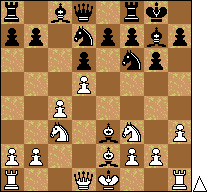
Opening
The middle
I made what I consider to be an elementary sort of error, in needlessly allowing the exchange of some minor pieces by Black, because of my rush to expand on the Queen side already. Nevertheless, I retained a real advantage despite the exchanges:
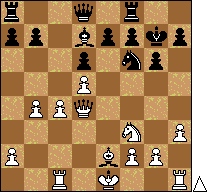
Opening after exchanges
Black made some passive moves that allowed me to build up to a great position in preparation for a King side attack; a quicker a5 and without the weakening b6 would have created counterplay more reliably:
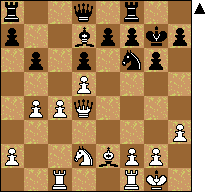
Rook lift
I started losing the thread when, instead of closing off the Queen side and turning my attention to the King side, I tried to “keep my options open” (as far as pushing for c5), and not only allowed Black to take control of the a file, but also I gave up my back rank, believing that there was no harm in doing that. In some sense, maybe that was correct (I was in fact never in danger of losing in this game), but from a practical point of view, I was creating conditions in which I could (and did) make further inaccuracies:
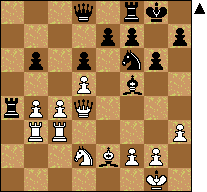
Black has counterplay
In a critical position in which I could have continued strongly, I made the mistake of the wrong exchange of pieces in which I took Black’s Bishop for my Knight:
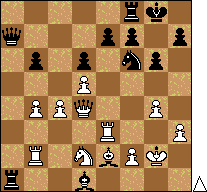
Exchange coming
I cannot hide the fact that I made a similar mistake in a previous chess game in September. If you look at that game, you will see that I created a dominant position and then “greedily” exchanged a good Knight for a bad Bishop. I have therefore uncovered a weakness of my play that I was not entirely aware of before: I like Bishops too much! I am stating this weakness publicly in hope of forcing myself to be careful in the future. It’s funny because I did not always have this prejudice; I used to play openings in which I quickly gave up a Bishop for a Knight. But then something changed. Now is the time to restore balance.
My opponent and I traded inaccuracies in which we did not play the most active moves possible (in particular, he made one of his Rooks pointlessly passive, as did I), but overall, we reached a point at which I was in danger of not getting anywhere at all, and I finally continued my King side attack:
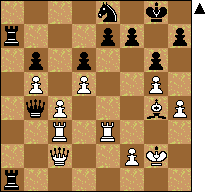
King side attack
Objectively, this should not have worked at all, but somehow, I had momentum and my opponent became passive at the worst possible moment, and after a single passive move with the Queen, the following position was reached, which I consider to be probably won for White:
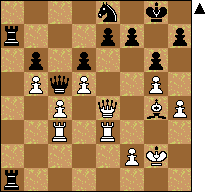
Strong for White
Black should have actively defended against the King side attack, by fearlessly moving the Pawn up with f5 instead of sitting around:
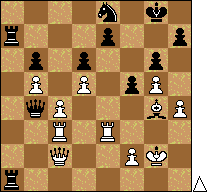
Strong defense
There is a fear some of us have of moving Pawns in front of our King in the face of an attack. But tactically, sometimes that is the correct thing to do.
The end
After the Pawn attack h5 by White, the game was basically over:
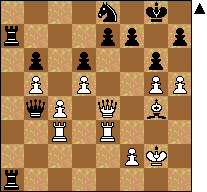
White's King side attack is overwhelming
Check out the game annotations for details, but this is the final position, in which Black resigned because of impending loss of a piece:
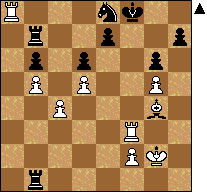
Final position
Notice how passive Black’s position was at this point, with the Rook on b7 doing nothing, the Knight pinned on the back rank, Black’s King suffocated.
Lessons learned
- Many of the problems faced by both sides in the game were a result of playing passively rather than immediately going on an attack or an active defense.
- I have to stop wanting to take Bishops with my Knights, despite the fact that in both games so far in which I’ve mistakenly done so, I have managed to activate my Bishop eventually to advantage after all, by accident.
- It is no secret that human chess play is annoyingly imperfect and sentimental compared to computer analysis; human play features blocks of related moves that are either a series of passive moves or a series of over-aggressive moves, rather than a “living in the present” choice of a good move in a given position without regard to what bad plan one started executing earlier. The task of any chess improver must be to be more computer-like, which is ironically more Zen-like.
What next?
The next Pittsburgh Chess Club Tuesday night tournament starts on Tuesday. I hope to play well in it. Obviously, I would like to win all six rounds and the tournament, but more than that, I simply wish to play well and let the wins take care of themselves from that. Also, there will be another round of the Pittsburgh Chess League in early December. After those are over, I will get another break from chess until sometime in January.
Conclusion
I was pleased at finally winning my game and helping the team win the match. And I am continuing to observe these patterns of passivity in my play as well as in the play of my opponents, hoping to learn something as I document them.